Nov 21, 2018
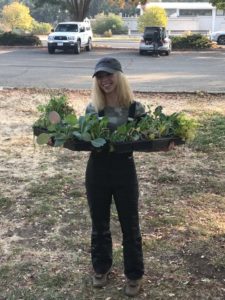 The Shalom demonstration food forest installation wrapped up Saturday. This was phase one of a larger goal to create a community garden in Vacaville. The past few weeks have been incredible community events, but the devastation of the fires and shootings weigh heavy on my heart. In spite of the smoke, people showed up and as a team we installed the Shalom garden. In spite of the fear of violence, Pastor Sue and husband Jim opened their home and served lovely meals. The fair share ethic in permaculture was embodied on these Saturdays:
The Shalom demonstration food forest installation wrapped up Saturday. This was phase one of a larger goal to create a community garden in Vacaville. The past few weeks have been incredible community events, but the devastation of the fires and shootings weigh heavy on my heart. In spite of the smoke, people showed up and as a team we installed the Shalom garden. In spite of the fear of violence, Pastor Sue and husband Jim opened their home and served lovely meals. The fair share ethic in permaculture was embodied on these Saturdays:
Kathleen brought pineapple guavas.
Ron, Sue and Neely shared their bounty of pomegranates.
Kevin and Jessica brought tools and strength.
Kristina from Lemuria donated two flats of vegetables.
Divina brought her infectious joy.
There are too many generous acts of kindness to list.
With facemasks on, members of our Solano community came together to build a garden and somehow exist between the speechless beauty and bottomless grief.
Even though I felt deep gratitude, for the kindness of the community, I awoke on the Sunday after the final installation feeling weepy and moving around my home directionless. Then I remembered that I came home from the installation with pomegranates! I got lost researching pomegranates and the best way to separate the seeds for juicing. As I separated the arils, I had a few bowls next to me. The worms got the membrane; the chickens received some of the arils that I was too lazy to separate. I pressed a beautiful burgundy apple pomegranate juice for my family and saved the peels of the pomegranate in the freezer to make a tea. While I got lost in the task I listened to the Mr. Rogers documentary, “Won’t you be my Neighbor?” The tears began to flow as he relayed his mother’s advice that when something is happening that is scary to always look for the people that are helping. I just spent three Saturdays surrounded by the people that are helping.
Oct 15, 2018
By: Gabriela Estrada, Project Coordinator for Sustainable Solano
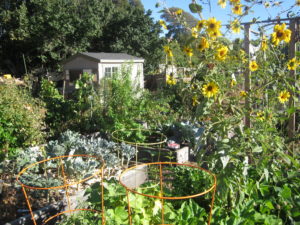 As a new member of Sustainable Solano, I have had the pleasure of interacting with different members that play key roles in advancing a message of Earth Care, People Care and Fair Share. While the message is clear and the work that has been put forth just as fantastic, it has been even more interesting discovering the instances and uniqueness of everyone’s relation to different aspects of sustainability and permaculture.
As a new member of Sustainable Solano, I have had the pleasure of interacting with different members that play key roles in advancing a message of Earth Care, People Care and Fair Share. While the message is clear and the work that has been put forth just as fantastic, it has been even more interesting discovering the instances and uniqueness of everyone’s relation to different aspects of sustainability and permaculture.
This month in Vacaville, while reflecting on this, I had the pleasure of learning about sustainable landscaping through presentations from local sustainable landscape experts, Jeff Barton and Kathleen Huffman.
The first of three workshops were led by Jeff Barton, whose lighthearted and authentic demeanor allowed for his audience to become engage and comfortably ask questions. During his presentation, Jeff spoke about his journey through sustainability and the tremendous impact that joining Sustainable Solano and digging his first swale had on him. This experience made him realize that “The solution to a lot of the problems is embarrassingly simple: We need to go back to basics and ask what the soil needs”.
This statement immediately allowed for people to reflect on and to firmly nod their heads. As the presentation continued, it became more of a conversation, and people voiced questions and concerns, to which Jeff did his best to answer, given his experience with similar problems. He shared that getting a pineapple sage plant, helps monitor the water of the entire garden, since it’s a plant that is very receptive to water usage, and encourage everyone to get one. I’m currently still looking for one.
While he spoke, it was clear that what he is passionate about the land and the people in it. For Jeff, it is a people first approach that will be key in making the world more sustainable. As such, we were encouraged as an audience to do just that, take care of our neighbor by sharing surpluses.
As the workshop continued, it was interesting to see how engaged people were and how responsive they were to the topic by chiming in their own ideas. While I really appreciated the level of engagement from everyone, what caught my attention the most was the level of engagement that his son (one of the youngest people in the room) had about the topic, and how full of curiosity he was. Given that he is the next generation, I see a bright future ahead of us.
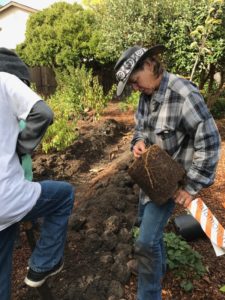 For the second and third workshop, I had the pleasure of hearing from Kathleen Huffman, who proudly shared with her audience that she was from Oklahoma and that she still said things like “Ya’ll”. After a couple chuckles from the room, she shared her experiences of growing up on a farm in Oklahoma, with wind mills, and the ways that her upbringing shaped her future. Throughout her talk, we got to see pictures of how she transformed her own backyard and learned about her design process.
For the second and third workshop, I had the pleasure of hearing from Kathleen Huffman, who proudly shared with her audience that she was from Oklahoma and that she still said things like “Ya’ll”. After a couple chuckles from the room, she shared her experiences of growing up on a farm in Oklahoma, with wind mills, and the ways that her upbringing shaped her future. Throughout her talk, we got to see pictures of how she transformed her own backyard and learned about her design process.
She shared how everyone can become more sustainable simply by changing our way of thinking and “finding better ways to take care of the soil in ways that makee sense for our needs”. As the presentation continued, it became clear that Kathleen was passionate about creating systemic long-term solutions for the world, and that the way she approached solutions was shaped by her own lived experiences.
In both workshops, Kathleen shared tricks she learned along the way that had helped keep her garden pest free like using coffee grinds from a local coffee roaster to take care of slug problems and using worms as little workers of her yard. As I saw her audience quickly writing notes and ask questions, I realized that one of the things I appreciated most about hearing her talk was her narrative and how she approached issues by observing and doing her research.
The principles of permaculture are Earth care, People care and Fair share ,and it is exactly these principles that both Jeff and Kathleen embody in their Sustainable Landscaping classes and efforts. Though they both come from different walks of life and relate to issues differently, one thing was clear: they both authentically showcase their love for the land and their belief in mixing the old and the new in order to create present-day solutions. And, while one of the main goals of creating a sustainable landscape is to conserve water, by attending these workshops, I gained so much more than tips to reduce my water usage. I got to see how two different passionate people use their authentic narrative daily to showcase solutions and to increase the possibilities of what the future can look like.
Oct 1, 2018
Since the launch of its Sustainable Backyard program in 2014, Sustainable Solano has created 15 food-producing, self-sustaining demonstration “food forest” gardens across Solano County on both public and private land. These gardens are primarily irrigated by secondary water sources (diverted roofwater, laundry-to-landscape greywater systems). The food forests are designed based on a permaculture design system of food production that utilizes the wisdom inherent in natural woodlands and the understanding of beneficial relationships between plants to create and support landscapes that grow food for human use.
The program officially expanded to Vacaville in mid-August. Since the launch, sustainable landscape classes have been offered to Vacaville residents covering sustainable landscape design, wise-water practices and permaculture.
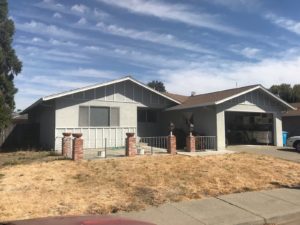 On Saturday, October 13th, residents will have a hands-on opportunity to help create Vacaville’s first private demonstration food forest garden, alongside their community, by attending the first demonstration installation workshop. The selected homeowner is a long-time Vacaville resident with a vision to transform his front yard from barren, dead grass to an oasis of edible and beneficial trees and plants. This demonstration food forest garden will be named “Healthy Futures” with the goal of providing nourishment and serve as a community asset to learn about sustainable landscaping.
On Saturday, October 13th, residents will have a hands-on opportunity to help create Vacaville’s first private demonstration food forest garden, alongside their community, by attending the first demonstration installation workshop. The selected homeowner is a long-time Vacaville resident with a vision to transform his front yard from barren, dead grass to an oasis of edible and beneficial trees and plants. This demonstration food forest garden will be named “Healthy Futures” with the goal of providing nourishment and serve as a community asset to learn about sustainable landscaping.
All are invited to help transform this lawn into a thriving ecosystem fed by secondary water sources. The garden will take three full days to complete and each public installation workshop will be hands-on.
This first workshop will focus on digging swales, diverting roofwater, planting fruit trees and sheet mulching to increase water-holding capacity and improve soil health. On Saturday, October 20th, with the guidance of Greywater Action, attendees will learn about greywater use and how to install a laundry-to-landscape system that diverts water from your washing machine to your garden reducing the need for potable water irrigation. Day three, Saturday, October 27th,, will wrap up the project with attendees planting a community of plants with multiple functions that support a healthy, diverse ecosystem, installation of water efficient in-line drip system.
The selection process for these sites are based on criteria such as yard access, greywater feasibility and sun orientation. Sites are assessed and selected by Sustainable Solano’s Advisory Board made up of dedicated Solano County residents aiming to raise sustainability awareness in Solano County.
There will be yearly ongoing workshops and tours of these demonstration food forest gardens on private and public land in each city. This project is made possible by funding and support of the Solano County Water Agency.


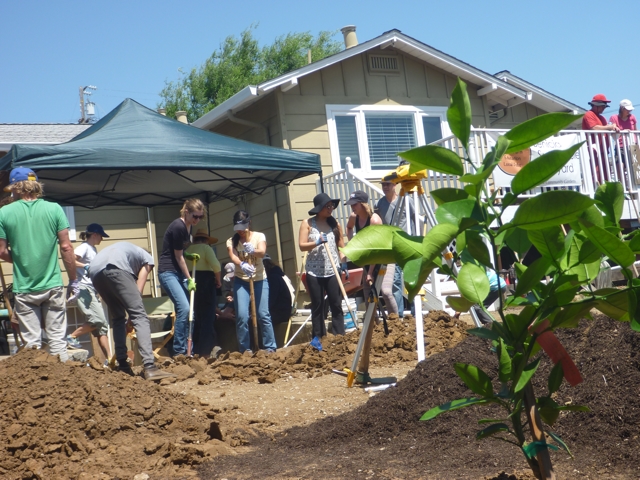
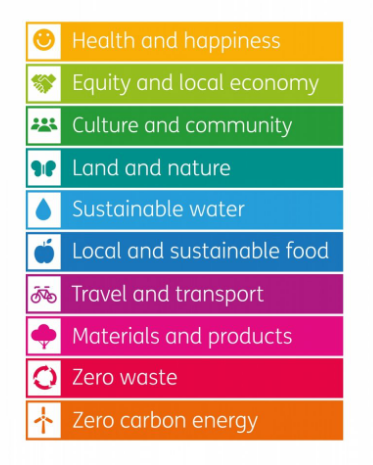
 The Shalom demonstration food forest installation wrapped up Saturday. This was phase one of a larger goal to create a community garden in Vacaville. The past few weeks have been incredible community events, but the devastation of the fires and shootings weigh heavy on my heart. In spite of the smoke, people showed up and as a team we installed the Shalom garden. In spite of the fear of violence, Pastor Sue and husband Jim opened their home and served lovely meals. The fair share ethic in permaculture was embodied on these Saturdays:
The Shalom demonstration food forest installation wrapped up Saturday. This was phase one of a larger goal to create a community garden in Vacaville. The past few weeks have been incredible community events, but the devastation of the fires and shootings weigh heavy on my heart. In spite of the smoke, people showed up and as a team we installed the Shalom garden. In spite of the fear of violence, Pastor Sue and husband Jim opened their home and served lovely meals. The fair share ethic in permaculture was embodied on these Saturdays: As a new member of Sustainable Solano, I have had the pleasure of interacting with different members that play key roles in advancing a message of Earth Care, People Care and Fair Share. While the message is clear and the work that has been put forth just as fantastic, it has been even more interesting discovering the instances and uniqueness of everyone’s relation to different aspects of sustainability and permaculture.
As a new member of Sustainable Solano, I have had the pleasure of interacting with different members that play key roles in advancing a message of Earth Care, People Care and Fair Share. While the message is clear and the work that has been put forth just as fantastic, it has been even more interesting discovering the instances and uniqueness of everyone’s relation to different aspects of sustainability and permaculture. For the second and third workshop, I had the pleasure of hearing from Kathleen Huffman, who proudly shared with her audience that she was from Oklahoma and that she still said things like “Ya’ll”. After a couple chuckles from the room, she shared her experiences of growing up on a farm in Oklahoma, with wind mills, and the ways that her upbringing shaped her future. Throughout her talk, we got to see pictures of how she transformed her own backyard and learned about her design process.
For the second and third workshop, I had the pleasure of hearing from Kathleen Huffman, who proudly shared with her audience that she was from Oklahoma and that she still said things like “Ya’ll”. After a couple chuckles from the room, she shared her experiences of growing up on a farm in Oklahoma, with wind mills, and the ways that her upbringing shaped her future. Throughout her talk, we got to see pictures of how she transformed her own backyard and learned about her design process. On Saturday, October 13th, residents will have a hands-on opportunity to help create Vacaville’s first private demonstration food forest garden, alongside their community, by attending the first demonstration installation workshop. The selected homeowner is a long-time Vacaville resident with a vision to transform his front yard from barren, dead grass to an oasis of edible and beneficial trees and plants. This demonstration food forest garden will be named “Healthy Futures” with the goal of providing nourishment and serve as a community asset to learn about sustainable landscaping.
On Saturday, October 13th, residents will have a hands-on opportunity to help create Vacaville’s first private demonstration food forest garden, alongside their community, by attending the first demonstration installation workshop. The selected homeowner is a long-time Vacaville resident with a vision to transform his front yard from barren, dead grass to an oasis of edible and beneficial trees and plants. This demonstration food forest garden will be named “Healthy Futures” with the goal of providing nourishment and serve as a community asset to learn about sustainable landscaping.